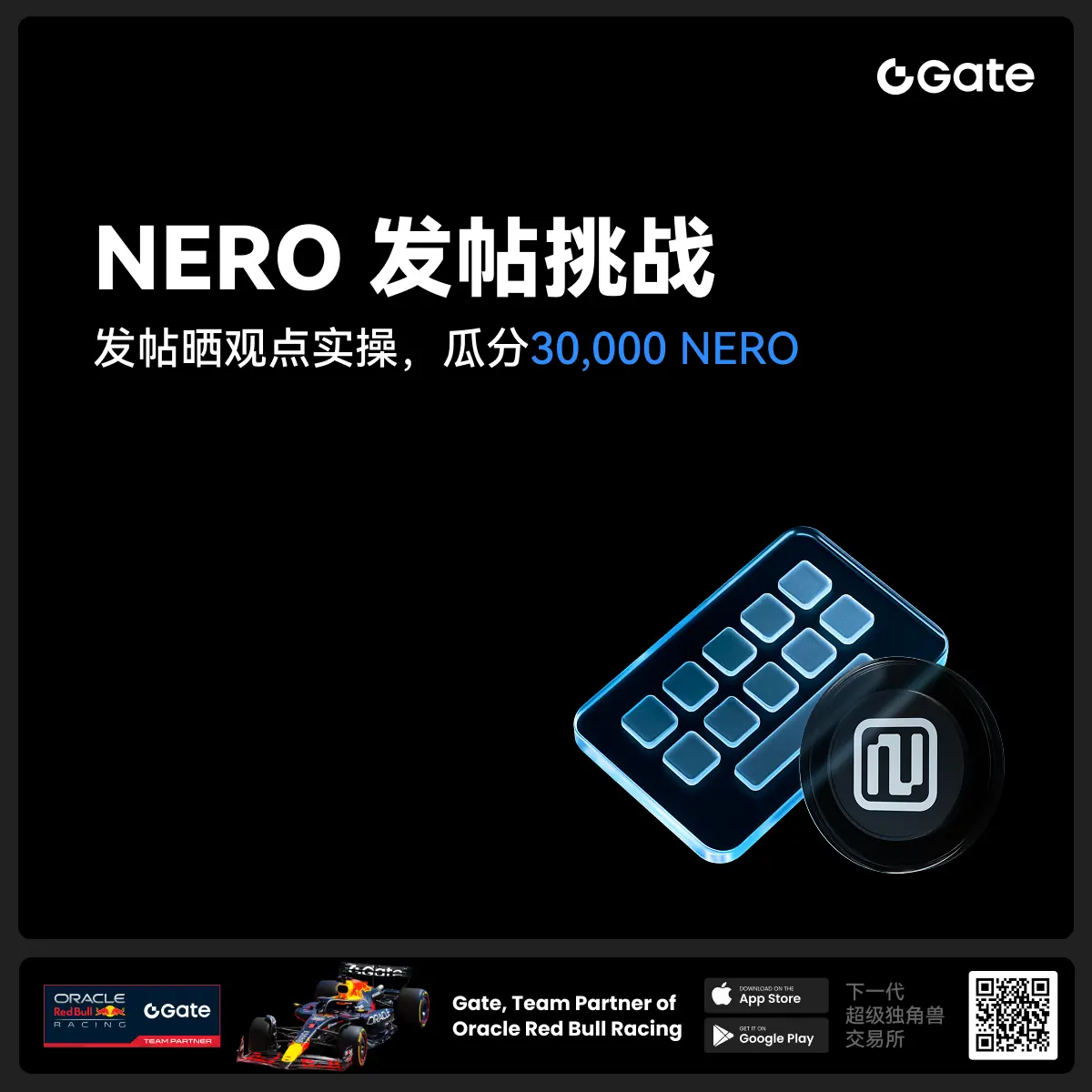- 話題1/3
12444 熱度
5516 熱度
29502 熱度
6941 熱度
20406 熱度
- 置頂
- 🎉 #CandyDrop合约挑战# 正式開啓!參與即可瓜分 6 BTC 豪華獎池!
📢 在 Gate 廣場帶話題發布你的合約體驗
🎁 優質貼文用戶瓜分$500 合約體驗金券,20位名額等你上榜!
📅 活動時間:2025 年 8 月 1 日 15:00 - 8 月 15 日 19:00 (UTC+8)
👉 活動連結:https://www.gate.com/candy-drop/detail/BTC-98
敢合約,敢盈利
- 🎉 攢成長值,抽華爲Mate三折疊!廣場第 1️⃣ 2️⃣ 期夏季成長值抽獎大狂歡開啓!
總獎池超 $10,000+,華爲Mate三折疊手機、F1紅牛賽車模型、Gate限量週邊、熱門代幣等你來抽!
立即抽獎 👉 https://www.gate.com/activities/pointprize?now_period=12
如何快速賺成長值?
1️⃣ 進入【廣場】,點擊頭像旁標識進入【社區中心】
2️⃣ 完成發帖、評論、點讚、發言等日常任務,成長值拿不停
100%有獎,抽到賺到,大獎等你抱走,趕緊試試手氣!
截止於 8月9日 24:00 (UTC+8)
詳情: https://www.gate.com/announcements/article/46384
#成长值抽奖12期开启#
- 📢 Gate廣場 #NERO发帖挑战# 秀觀點贏大獎活動火熱開啓!
Gate NERO生態周來襲!發帖秀出NERO項目洞察和活動實用攻略,瓜分30,000NERO!
💰️ 15位優質發帖用戶 * 2,000枚NERO每人
如何參與:
1️⃣ 調研NERO項目
對NERO的基本面、社區治理、發展目標、代幣經濟模型等方面進行研究,分享你對項目的深度研究。
2️⃣ 參與並分享真實體驗
參與NERO生態周相關活動,並曬出你的參與截圖、收益圖或實用教程。可以是收益展示、簡明易懂的新手攻略、小竅門,也可以是行情點位分析,內容詳實優先。
3️⃣ 鼓勵帶新互動
如果你的帖子吸引到他人參與活動,或者有好友評論“已參與/已交易”,將大幅提升你的獲獎概率!
NERO熱門活動(帖文需附以下活動連結):
NERO Chain (NERO) 生態周:Gate 已上線 NERO 現貨交易,爲回饋平台用戶,HODLer Airdrop、Launchpool、CandyDrop、餘幣寶已上線 NERO,邀您體驗。參與攻略見公告:https://www.gate.com/announcements/article/46284
高質量帖子Tips:
教程越詳細、圖片越直觀、互動量越高,獲獎幾率越大!
市場見解獨到、真實參與經歷、有帶新互動者,評選將優先考慮。
帖子需原創,字數不少於250字,且需獲得至少3條有效互動
- 🎉 親愛的廣場小夥伴們,福利不停,精彩不斷!目前廣場上這些熱門發帖贏獎活動火熱進行中,發帖越多,獎勵越多,快來GET你的專屬好禮吧!🚀
1️⃣ #GateLaunchpad上线IKA# |IKA認購體驗
在Gate廣場帶話題曬出你的IKA Launchpad認購體驗,4位幸運分享者講瓜分$200分享獎池!
詳情 👉️ https://www.gate.com/post/status/12566958
2️⃣ #ETH冲击4800# |行情分析預測
大膽發帖預測ETH走勢,展示你的市場洞察力!10位幸運用戶將平分0.1 ETH 獎勵!
詳情 👉️ https://www.gate.com/post/status/12322403
3️⃣ #创作者活动第二期# |ZKWASM話題
在廣場或推特發布與 ZKWASM 或其交易活動相關的原創內容,瓜分4,000枚ZKWASM!
詳情 👉️ https://www.gate.com/post/status/12525794
4️⃣ #Gate广场征文活动第二期# |ERA話題
談談你對ERA的觀點/體驗,參與並推廣活動,700 ERA大獎等你贏!
詳情 👉️ https://www.gate.com/post/status/12361653
5️⃣ #MBG任务挑战# |MBG話題
分享你對MBG的洞察,積極參與和推廣MBG活動,20位小 - 🎉Gate 2025 上半年社區盛典:內容達人評選投票火熱進行中 🎉
🏆 誰將成爲前十位 #Gate广场# 內容達人?
投票現已開啓,選出你的心頭好
🎁贏取 iPhone 16 Pro Max、限量週邊等好禮!
📅投票截止:8 月 15 日 10:00(UTC+8)
立即投票: https://www.gate.com/activities/community-vote
活動詳情: https://www.gate.com/announcements/article/45974
Japan’s ‘slow’ approval culture stifles crypto adoption: Expert
Japan’s regulatory bottlenecks, not taxes, are the real reason crypto innovation is leaving the country, according to Maksym Sakharov, co-founder and CEO of Web3 firm WeFi.
Sakharov told Cointelegraph that even if the proposed 20% flat tax on crypto gains is implemented, Japan’s “slow, prescriptive, and risk‑averse” approval culture will continue to push startups and liquidity offshore.
“The 55% progressive tax is painful and very visible, but it’s not the core blocker anymore,” he said. “The FSA/JVCEA pre‑approval model and the absence of a truly dynamic sandbox are what keep builders and liquidity offshore.”
Listing a token or launching an initial exchange offering (IEO) in Japan involves a two-step regulatory process. First, a self-regulatory review by the Japan Virtual and Crypto Assets Exchange Association (JVCEA) is needed, followed by final oversight by the Financial Services Agency (FSA).
That process can stretch go-to-market timelines to 6–12 months or more, Sakharov said, adding that it “burns runway and forces many Japanese teams to list first overseas.”
He noted that there have been repeated delays in areas such as JVCEA token screening, IEO white paper vetting and product change notifications to the FSA, which often require several rounds of revision. “The process is designed to avoid downside, not to accelerate innovation,” he noted.
Japan trails UAE, South Korea and Singapore
Compared to other jurisdictions, Sakharov said Japan lags significantly. “Japan is slower,” he said, noting that a simple token listing can take half a year or longer.
“Singapore is strict too, but it provides clearer pathways… The UAE is faster on average… South Korea’s VAUPA focuses on ongoing exchange obligations rather than a Japan-style external pre-approval, so listings are typically processed materially faster.”
He warned that the proposed 20% tax and reclassification of crypto as a financial product won’t shift the status quo unless the culture around approvals changes. “Culture eats tax cuts for breakfast,” Sakharov said.
As a solution, Sakharov urged regulators to adopt “time‑boxed, risk‑based approvals,” implement a functional sandbox that supports staking and governance experimentation, and introduce proportional disclosure requirements.
He warned that without these changes, domestic crypto projects will likely continue to scale abroad, driven by uncertainty around approvals and long wait times, rather than tax burdens. “It’s about building for 12 months only to be told your token can’t be listed or your product can’t launch.”
Related: Asia’s wealthy shifting from US dollar to crypto, gold, China
Asia’s lead in crypto draws global attention
Earlier this month, Maarten Henskens, head of protocol growth at Startale Group, said Asia’s leadership in tokenization is drawing growing attention from global investors, with regulatory clarity in the region attracting capital that was once on the sidelines.
Hong Kong has moved swiftly, launching the Ensemble Sandbox as a fast-track regulatory innovation hub. “While Japan is building long-term depth, Hong Kong is showing how agility can bring experimentation to life,” Henskens said.
The United Arab Emirates has been another Asian country making strides in tokenization. The city’s regulatory authorities have introduced progressive frameworks that encourage the issuance and trading of tokenized securities, attracting global investors and fintech firms.
Magazine: Asia Express: Bitcoiner sex trap extortion? BTS firm’s blockchain disaster